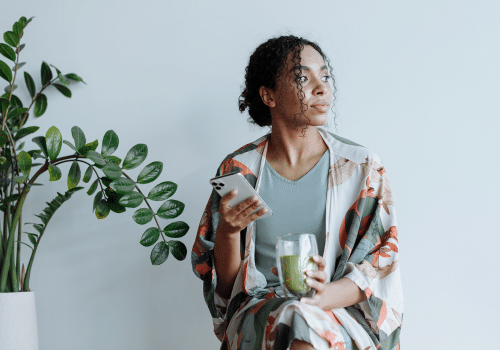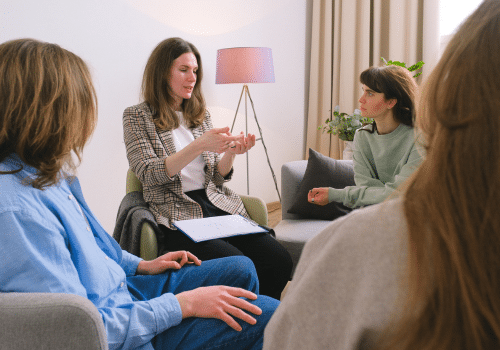There’s something quietly life-changing about hearing your inner world spoken aloud by someone else.
Perhaps it’s a stranger on TikTok or Instagram talking about neurodivergent sensory sensitivities, masking, time differences, rejection sensitivity, or autistic burnout…
…And something in you stirs.
This is not just a flicker of curiosity.
It is the moment when the unnamed becomes known.
And in that moment, a part of you that has been quietly bracing for years finally exhales.

Subscribe to stay updated with the latest blog posts from Leone Centre.
As if someone has reached across the void, placed a hand on your shoulder, and whispered: This is real. You’re not imagining it. You’re not broken. You’re just processing the world differently.
These moments matter. Especially for those of us who have spent years managing unnamed experiences, the language of neurodivergence offers something sacred: the gift of being seen.
Not because you found a diagnosis.
But because you found a mirror.
A mirror that reflects you back to yourself, not as broken, but as someone who has been endlessly adapting, surviving, and enduring in a world where you perhaps felt you never quite fit.
This is not about labels.
It’s about the longing to be understood, seen, heard, and held.

The Power of Naming: Self-Diagnosis and Neurodivergence
What does it mean to name your experience, in a world that has so often denied it?
Self-diagnosis is not the claiming of illness. It is the reclaiming of self. It is the slow, brave act of noticing (“I do this, I feel this, I navigate here”) and daring to believe that those patterns mean something. That they deserve understanding. That you deserve understanding.
Sometimes, we reach for language not because we want a box to live inside, but because we need a doorway to step through. A way to explain why noise pierces like glass, why time slips through our fingers like sand, or why eye contact feels like exposure.
Diagnosis, Self-Diagnosis, and Barriers to Neurodiversity Assessment
In the clinical world, diagnosis is protocol, with history-taking, questionnaires and observations.
But the truth lived by so many is that access to this process is far from equal.
Women, people of colour and LGBTQ+ individuals are often overlooked, misunderstood, or mistrusted. The models of neurodivergence are old and can be narrow and maculinised.
Long NHS waiting lists stretch months, sometimes years, leaving people in limbo and forced to manage daily life without guidance, support, or understanding. In the meantime, the very systems designed to help often deny the care that could make life more manageable – therapeutic support, accommodations, or simply being seen and heard.
For many, the formal diagnostic pathway is not just slow, it can be invalidating and stressful. Repeatedly explaining yourself, filling out rigid questionnaires that fail to capture lived reality, or being told that your experiences “don’t fit the criteria” can feel like a continual erasure.
The result is exhaustion, self-doubt, and the silent toll of trying to adapt in a world that was never built for neurodivergent ways of being.
So, what do we do when the system cannot see us?
We turn to each other.
We turn to digital spaces where the line between “expert” and “experience” blurs, and the wisdom of lived experience takes centre stage. We find fragments of ourselves in the comments section, in hashtags, in stories shared by people who were also told they were too dramatic, too forgetful, too intense.
And in these moments, finding professional support through neurodiversity-affirming therapy can be a critical step toward healing and self-acceptance.
The Beauty of Naming our Needs
When you find a word such as ADHD, autism, dyspraxia, that explains the unseen threads that have shaped your life, something miraculous happens.
You begin to forgive yourself.
You begin to soften toward the parts of you that were always blamed. You stop asking, “What’s wrong with me?” and begin asking, “What has this part of me been trying to survive?”
This is the power of language. Not as diagnosis, but as deliverance.
As Chris Packham once put it, “I was a very angry young man, confused because of my undiagnosed autism. It had an enormous impact on my life.”
To name is not to limit; it is to honour, listen and embrace.
Do You Need a Diagnosis to Choose Yourself?
No, you do not need a certificate to make adjustments, to put in earplugs, to cancel a plan because your body says no. You do not need external approval to soften the lighting, to turn down the volume, to say: “I don’t have to force myself to”.
You are allowed to adjust your life in ways that make it more liveable. You are allowed to soothe your nervous system before it shatters. You are allowed to live gently.
What We Gain and What We Risk in the Journey
There is beauty in naming. But also vulnerability.
To name your experience is to make it visible. And visibility is brave.
You may encounter people who doubt you. Who accuse you of faking, of seeking attention, of jumping on a trend. Their discomfort is not your responsibility. You do not owe anyone your experience to prove your truth.
Still, we cannot deny the complexity. Naming brings both healing and hazard, it offers language for compassion, but it also exposes you to misunderstanding.
The Gifts:
- A deep compassion for yourself; for the child you were, for the adult you became while coping.
- A community that speaks your language
- A narrative that reorders your past, reshapes your present, and reimagines your future.
The Risks:
- A hunger for certainty.
- A vulnerability to misinformation, over-identification, or fear of not being “enough” — neurodivergent enough, struggling enough, worthy enough.
- A society that still demands proof before it offers care.
And sometimes, the risks are quieter, more personal.
Self-recognition does not always arrive as relief. For some, it can stir fear, anger, or grief, a reckoning with years of confusion, or a sudden disorientation that feels like losing your footing. In the search for belonging, it is easy to cling to fragments found online, yet not all sources offer truth.
Recent studies have shown that much of the neurodivergence-related content on TikTok is misleading, or at best incomplete. Stories shared there can be validating, but they can also blur the line between solidarity and certainty. When your sense of self is built only on scrolling, it can leave you both comforted and unmoored.
This does not mean the feelings that surface are invalid. It means they deserve care, context, and companionship. If you recognise yourself in these patterns, a neurodiversity-affirming therapist can help you explore them with curiosity rather than fear, grounding your self-discovery in compassion, clarity, and support.
And still, the truth remains: if something helps you live more gently, more authentically, more wholly, it is real. And it is enough.
A Neurodivergent-Affirming Approach to Healing
To explore your neurodivergence is not to fix yourself.
It is to meet yourself with curiosity, with grace, and with new eyes.
You might never seek a formal diagnosis. You might. Either way, your experience is valid.
You might discover rituals of care such as stimming, planning, pausing, or protecting your peace. You might cry in the supermarket. You might carry sunglasses in your pocket like a shield. You might tell someone, “I need a moment”, and mean give yourself grace for the first time.
You might also seek therapy from someone who truly recognises you, affirms your experience, and specialises in supporting neurodivergent individuals. Therapy can be a space where your patterns, needs, and unique ways of being are fully understood, rather than pathologised or forced to fit a neurotypical template. It is a practice of guidance, support, and reflection that honours you as you are.
And in all of this, there is healing.
There is a quiet revolution that begins the moment we stop asking, “Am I allowed to call myself this?” and start asking: “What would it mean to treat myself as someone worth tending to?”
That is where it begins.
Not with a label.
But with a love.
“Neurodivergent-affirming therapy honours who you are, beneath the mask, beyond the diagnosis. Together, we make space for your grief, celebrate your insight, and gently build a life that feels safe, real, and fully your own.” – Olena Baeva
Neurodivergent-Affirming Therapy: Support Without a Label
You do not need a formal diagnosis to begin receiving neurodivergent-affirming therapy or counselling. Therapy can help you achieve greater clarity, develop strategies that align with your natural ways of being, and find approaches to life that fit you and not a neurotypical template that may feel constraining or unhelpful.
Neurodivergent-affirming therapy is not about fixing or changing you. It is about understanding your patterns, supporting your needs, and creating a space where your experiences are fully validated. It can help you:
- Develop coping strategies that honour your nervous system and natural rhythms.
- Build self-compassion and confidence in your unique ways of engaging with the world.
- Navigate relationships, work, and daily life with tools that feel supportive rather than prescriptive.
- Explore sensory, emotional, and cognitive patterns to better understand what helps you thrive.
- Cultivate rituals of care, self-regulation, and creative expression that enhance your wellbeing.
Therapy offers guidance and support without requiring a “proof of difference.” It is a space where you are met with curiosity, respect, and affirmation; where your individuality is the starting point, not a problem to be fixed.
Therapy at Leone Centre
At Leone Centre, we approach neurodiversity with respect and understanding of its complexities through the lens of psychotherapy. We acknowledge that neurodivergence brings with it not only unique strengths but also distinct ways of engaging with the world, both personally and in the relational dynamics of couples and families.
Learn more about neurodivergent-affirming therapy at Leone Centre.
Neurodivergent-affirmative therapy recognises the unique perspectives, talents, and gifts each individual brings to the world, as well as any areas where additional support may be helpful.
At Leone Centre, we offer Neurodiversity-Affirmative Counselling in person and online in our centres across London. Our team of therapists specialises in supporting neurodivergent individuals, couples, and families.










